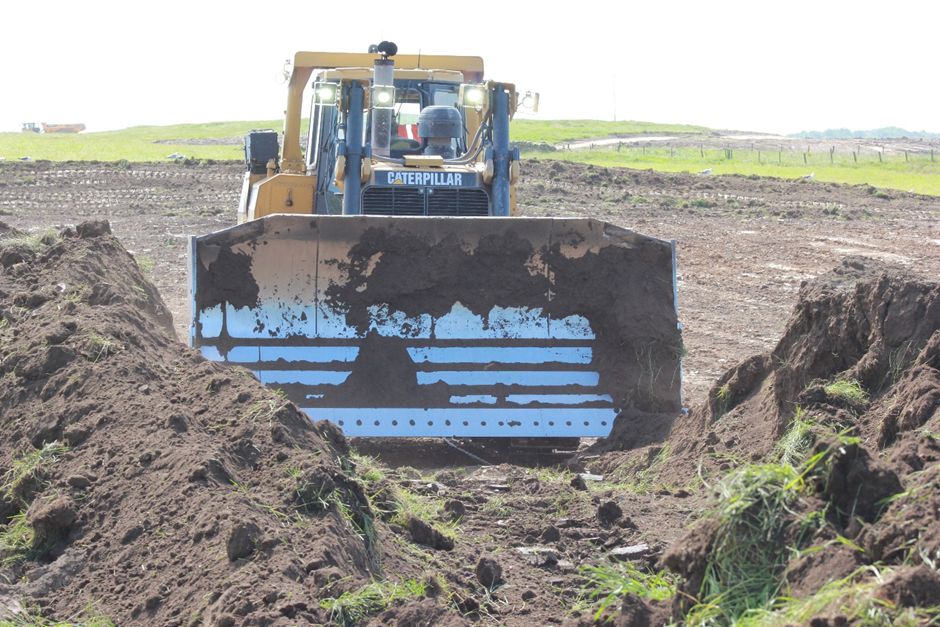Durham County Council has decided not to take action against Banks Mining over a planning breach at the UK’s newest coal mine, DeSmog UK can reveal.
The council told DeSmog UK that it would not seek to penalise Banks for failing to complete an access road to its mine at Bradley, County Durham, before commencing work as it was not “an efficient use of resources for us to take enforcement action.”
The completion of the access road was one of the conditions agreed between the council and Banks Mining as part of the planning permission for the mine. The way the clause is worded suggested the road needed to be completed prior to work commencing.
DeSmog UK has discovered through a Freedom of Information request that the council is yet to complete a final inspection of the road, or issue a certificate of completion. Banks Mining announced it had commenced work at the site on 23 May 2018, before the access road was completed.
Green Party co-leader Caroline Lucas said the revelation “raises serious concerns about whether they are complying with their planning permission.”
Campaigners have questioned the efficacy of the planning permission if the council does not have the resources to enforce the conditions.
The Bradley mine in Pont Valley is a controversial development.
Banks Group took over permission for the mine in 2014 after its previous holder, UK Coal, went bust. After decades of stasis, Banks Mining announced in January this year that it was trying to acquire the land rights to push ahead with the project.
Permission to mine under the current license would have expired on 3 June 2018 if Banks Mining had not commenced work at the site.
Local residents opposed to the plans responded by setting up a resistance camp on the proposed site of the access road. They believed that if they could prevent this being completed, Banks Mining could not commence work.
However, as a DeSmog UK investigation previously revealed, Banks Mining commenced soil stripping seemingly before complying with a number of planning conditions, including the completion of the access road.
Crucially, the condition stating that the access road must be completed before work commenced is contained in a contractual agreement between the council and the company (known as an S106). It is not part of the requirements put forward by the Planning Inspectorate.
This means the council has the discretion to overlook or choose not to enforce particular conditions. The council said that it had taken the decision that until Banks Mining wanted to transport extracted coal off the site, the access road did not need to be completed.
When pushed on what resources would be needed to enforce the condition, the council told DeSmog UK:
“To enforce the S106 could have required significant legal action through the courts. This was not considered an appropriate course of action bearing in mind the technical nature of the failure to comply.”
Tracy Gillman and June Davison from the Campaign to Protect Pont Valley, which has occupied a camp at the site since Banks Mining announced its plans, told DeSmog UK:
“The point of the s106 was to make the proposed opencast environmentally and publicly acceptable. How can a planning inspector’s condition regarding access to the site and safety on the public highway, override a moral obligation not to commence destroying the environment by stripping soil until legally and morally acceptable obligations are met?”
“This has implications for other developments in County Durham. If our elected members and council officers are not able to stand up to developers for fear of legal or financial repercussions, then how can we hold to account any company out to make a profit?”
Lewis Stokes, Community Relations manager at The Banks Group, disagreed that the company was breaching its agreement. He told DeSmog UK: “As with all Banks Group projects, work at the Bradley surface mine has been progressed in strict accordance with the requirements of its planning permission.”
Matthew McFeeley, a lawyer for campaign group Coal Action Network, contradicted this, however. He told DeSmog UK that the council “clearly has the power to enforce this requirement”, but has chosen to allow Banks Mining to continue regardless of the breach of the planning agreement.
“The Council has acknowledged that Banks is in breach but has offered no justification for failing to enforce its own rules. Even if it is technically within the Council’s power to do this, it certainly appears to be poor practice and residents are justifiably upset that the Council seems more interested in appeasing the coal industry than in protecting the rights of its own constituents”, he said.
Green Party MP Lucas, who has long campaigned against the mine, said the decision to allow a new opencast coal mine is contrary to the UK’s commitment to drastically cut greenhouse gas emissions. She told DeSmog UK:
“This dirty and dangerous opencast coal mine should never have got this far. We need a system that considers our commitments to stopping climate change by blocking new mines and keeping fossil fuels in the ground.”
Updated 09/08/2017: Quotes from Matthew McFeeley and Lewis Stokes were added.
Subscribe to our newsletter
Stay up to date with DeSmog news and alerts







